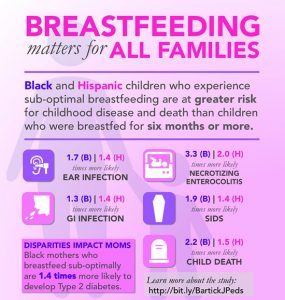Lack of optimal breastfeeding may cause alarming disparities in infant deaths, study finds
November 23, 2016
Lack of optimal breastfeeding led to more than twice the number of deaths among African-American infants than white infants in computer models. This finding was published in a recent study co-authored by a researcher at The University of North Carolina’s Gillings School of Global Public Health.
The study, titled “Disparities in Breastfeeding: Impact on Maternal and Child Health Outcomes and Costs,” was published in the most recent issue of the Journal of Pediatrics. Researchers reported that, compared to white infants, African-American infants had more than three times the rate of necrotizing enterocolitis, a devastating disease in preterm infants attributable to suboptimal rates of feeding with their mother’s own milk.

Dr. Alison Stuebe
Alison Stuebe, MD, Distinguished Scholar of Infant and Young Child Feeding in the Department of Maternal and Child Health at the Gillings School, was among the study’s co-authors. A member of the Carolina Global Breastfeeding Institute, Stuebe also is associate professor of obstetrics and gynecology in UNC’s School of Medicine.
“These disparities reflect barriers to breastfeeding, such as lack of paid leave and outdated maternity care, that disproportionately impact families of color,” said Stuebe. “We can reduce health disparities by protecting each woman’s right to breastfeed her children.”
It is recommended that women exclusively breastfeed each of their children for the first six months of life, followed by continued breastfeeding for the duration of the first year while complementary foods are introduced. The study authors defined this practice as “optimal breastfeeding.”
White women initiate breastfeeding at much higher rates than African-American women and at slightly higher rates than Hispanic women; moreover, white women breastfeed longer and have higher rates of exclusive breastfeeding. This study is the first to show how these disparities may translate into differences in health outcomes.
 Two common diseases of infancy merit particular concern for African-American and Hispanic infants: ear infections and gastrointestinal infections. Compared with white infants, ear infections due to suboptimal breastfeeding were 1.7 times more common in African-American infants and 1.4 times more common in Hispanic infants, while gastrointestinal infections due to suboptimal breastfeeding were 1.3 to 1.4 times as common among both African-American and Hispanic infants.
Two common diseases of infancy merit particular concern for African-American and Hispanic infants: ear infections and gastrointestinal infections. Compared with white infants, ear infections due to suboptimal breastfeeding were 1.7 times more common in African-American infants and 1.4 times more common in Hispanic infants, while gastrointestinal infections due to suboptimal breastfeeding were 1.3 to 1.4 times as common among both African-American and Hispanic infants.
Ear infections and gastrointestinal infections can translate into significant economic insecurity for parents who must miss work to care for sick children. Department of Labor statistics show that African-American and Hispanic mothers are more likely both to be heads of households and to have low-wage jobs that lack paid sick leave.
The researchers also found differences in maternal health outcomes related to breastfeeding. For both hypertension and Type 2 diabetes, there was a 1.4-fold higher rate for African-American women compared to white women, which was attributable to suboptimal breastfeeding practices.
This study was funded by the W.K. Kellogg Foundation. It used computer modeling to simulate hypothetical cohorts of African-American, white and Hispanic women and their children, based on current literature linking disease risk and breastfeeding.
Gillings School of Global Public Health contact: David Pesci, director of communications, (919) 962-2600 or dpesci@unc.edu
